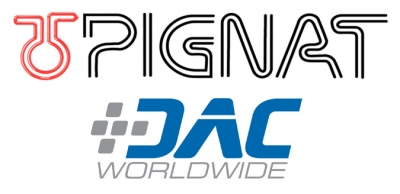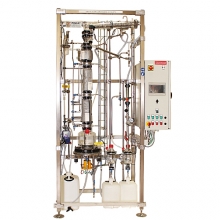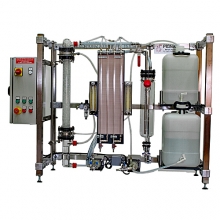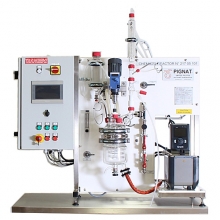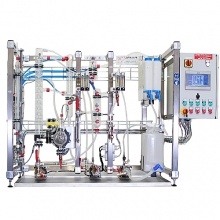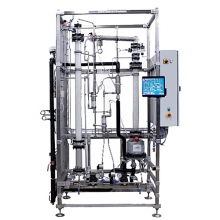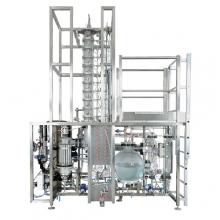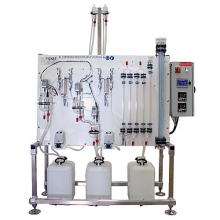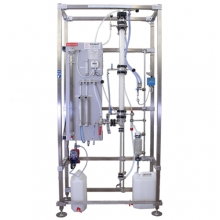Chemical Engineering
Advanced Training Solutions for Chemical Engineering & Unit Operations
Pignat’s comprehensive range of chemical engineering training solutions supports hands-on education from basic lab experiments to industrial-scale simulations. The Mini Units are ideal for introductory and lab-scale learning, offering compact systems for foundational topics like distillation, extraction, evaporation, and reaction kinetics. These units are designed to provide clear visual operation and quick setup—perfect for university labs, technical schools, and entry-level chemical engineering courses.
For more advanced study, the Unit Operations line features pilot-scale systems that mimic real industrial processes with greater complexity. Students and professionals can explore filtration, adsorption, crystallization, biodiesel synthesis, and multi-phase separation with precision and realism. Multi-Purpose Reactors—available in manual and SCADA-automated versions—enable in-depth analysis and control of chemical reactions across a wide range of configurations. At the highest level, OTP Pilots offer industrial-scale learning with systems like continuous distillation and CO₂ absorption and regeneration, preparing learners for careers in chemical plants, energy sectors, and process industries.
-
Item Number:DVI/3000Pignat's standard-size, floor-standing Batch Continuous Distillation trainer (DVI/3000) allows students to operate both a continuous and batch distillation process.
-
Item Number:ABS/100The trainer allows students to study the absorption of NH3 or CO2 in water, determine the material balance of the gaseous solute, influence of operational parameters on efficiency of the column, thermal balance, packing factor, and more. Educational handbook and technical manual included.
-
Item Number:REA/3000Pignat's Computerized Chemical Reactor (REA/3000) is a one-gallon, controlled, multi-purpose, jacketed glass reactor system specifically designed for education and research. This unit supports the study of controlled batch chemical reactions and allows students to operate and experience reaction processes and modify the variables upon which the reactions being studied are based.
-
Item Number:DVI/100, DVI/300Explore the Pignat DVI/100 Continuous Distillation unit – a compact, glass-based educational system for studying thermal separation and column hydrodynamics in chemical engineering programs.
-
Item Number:ABR/3000The regeneration process is observed on the second column, which is continuously fed. An energy‐saving heat exchanger is placed between the two columns to optimize energy usage. With this unit, students are able to study various control loops, determine mass balance, and process efficiency. The unit also includes a LabView monitoring system.
-
Item Number:OTP-DCPignat's Controlled Distillation Unit (OTP-DC) is an automated, controlled, continuous distillation pilot plant. This industrial-scale unit allows students to study unit operations, maintenance, and process supervision.
-
Item Number:DIS/1000Explore batch distillation principles with the Pignat DIS/1000. This lab-scale glass unit allows for in-depth study of vapor-liquid equilibrium, reflux control, and yield analysis in a hands-on educational setting.
-
Item Number:EEA/1000 (Manual) and EEA/2000 (Computerized)Explore Pignat’s EEA/1000 and EEA/2000 ebulliometers for studying binary mixtures, boiling point determination, and liquid-vapor equilibrium under atmospheric and vacuum conditions. Ideal for chemical engineering education and lab research.
-
Item Number:RAP/4000This self-contained system facilitates the study of pressure drop due to flow restrictions through valves, strainers, fittings, and pipe of varying diameters, different surface roughnesses, and lengths. The system also facilitates the study of flow rate measurement methods such as orifice assembly, venturi meter, variable-area flow meter, and by calibrated tank vs. time.
-
Item Number:ABS/2000The trainer allows students to study the absorption of NH3 or CO2 in water, determine the material balance of the gaseous solute, influence of operational parameters on efficiency of the column, thermal balance, packing factor, and more. Educational handbook and technical manual included.

